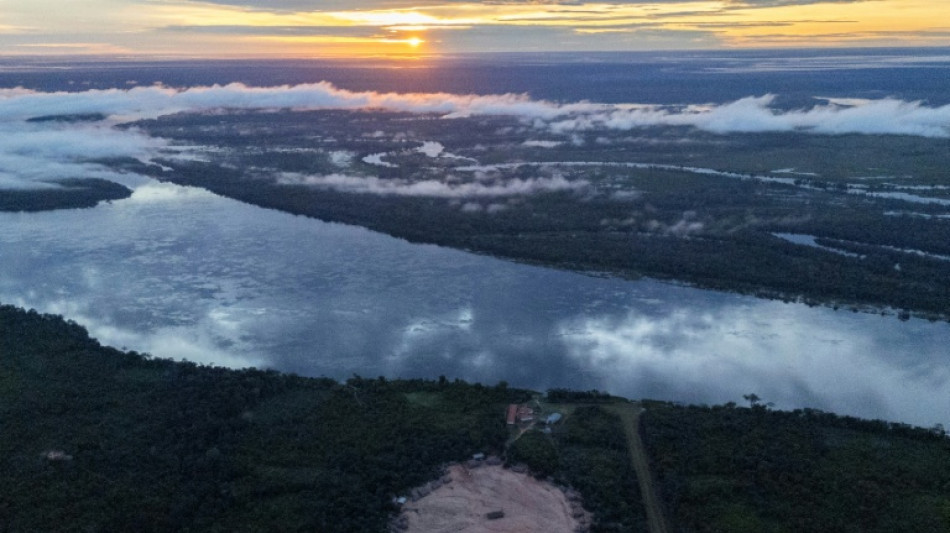
-
 Trump admin proposes redefining 'harm' to endangered animals
Trump admin proposes redefining 'harm' to endangered animals
-
Australia's Mary Fowler set for long lay-off after ACL injury

-
 Rubio to meet French leaders for talks on Ukraine
Rubio to meet French leaders for talks on Ukraine
-
Webb spots strongest 'hints' yet of life on distant planet

-
 Arteta's Arsenal come of age with Madrid masterclass
Arteta's Arsenal come of age with Madrid masterclass
-
None spared in Nigeria gun, machete massacre: survivors
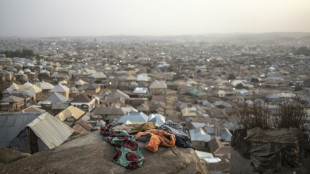
-
 'No problem' if Real Madrid replace me: Ancelotti
'No problem' if Real Madrid replace me: Ancelotti
-
Inter dreaming of treble glory after reaching Champions League semis

-
 'No limits' for treble-hunting Inter, says Pavard
'No limits' for treble-hunting Inter, says Pavard
-
Inter off Bayern to reach Champions League last four

-
 Rice 'knew' Arsenal would dethrone Real Madrid
Rice 'knew' Arsenal would dethrone Real Madrid
-
US stocks fall with dollar as Powell warns on tariffs
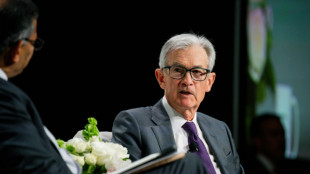
-
 Arsenal oust holders Real Madrid to reach Champions League semis
Arsenal oust holders Real Madrid to reach Champions League semis
-
Arsenal defeat Real Madrid to reach Champions League semis

-
 AMD says US rule on chips to China could cost it $800 mn
AMD says US rule on chips to China could cost it $800 mn
-
Inter hold off Bayern to reach Champions League last four

-
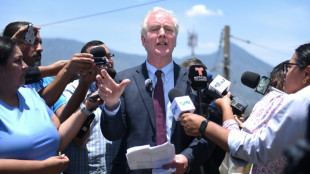 El Salvador rejects US senator's plea to free wrongly deported migrant
El Salvador rejects US senator's plea to free wrongly deported migrant
-
Newcastle thrash Crystal Palace to go third in Premier League

-
 Zuckerberg denies Meta bought rivals to conquer them
Zuckerberg denies Meta bought rivals to conquer them
-
Starc stars as Delhi beat Rajasthan in Super Over

-
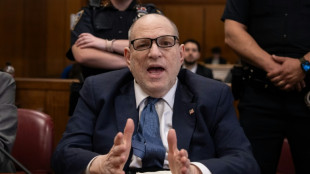 Weinstein asks to sleep in hospital, citing prison 'mistreatment'
Weinstein asks to sleep in hospital, citing prison 'mistreatment'
-
Amorim asks McIlroy to bring Masters magic to Man Utd

-
 Ruud keeps Barcelona Open defence on course
Ruud keeps Barcelona Open defence on course
-
Trump tariffs could put US Fed in a bind, Powell warns

-
 CONCACAF chief rejects 64-team World Cup plan for 2030
CONCACAF chief rejects 64-team World Cup plan for 2030
-
Putin praises Musk, compares him to Soviet space hero

-
 Son to miss Spurs' Europa League trip to Frankfurt
Son to miss Spurs' Europa League trip to Frankfurt
-
US senator in El Salvador seeking release of wrongly deported migrant

-
 Trump tariffs could put the US Fed in a bind, Powell warns
Trump tariffs could put the US Fed in a bind, Powell warns
-
US judge says 'probable cause' to hold Trump admin in contempt

-
 India opposition slams graft charges against Gandhis
India opposition slams graft charges against Gandhis
-
Nate Bargatze to host Emmys: organizers

-
 US Fed Chair warns of 'tension' between employment, inflation goals
US Fed Chair warns of 'tension' between employment, inflation goals
-
Trump touts trade talks, China calls out tariff 'blackmail'

-
 US judge says 'probable cause' to hold govt in contempt over deportations
US judge says 'probable cause' to hold govt in contempt over deportations
-
US eliminates unit countering foreign disinformation

-
 Germany sees 'worrying' record dry spell in early 2025
Germany sees 'worrying' record dry spell in early 2025
-
Israel says 30 percent of Gaza turned into buffer zone

-
 TikTok tests letting users add informative 'Footnotes'
TikTok tests letting users add informative 'Footnotes'
-
Global uncertainty will 'certainly' hit growth: World Bank president

-
 EU lists seven 'safe' countries of origin, tightening asylum rules
EU lists seven 'safe' countries of origin, tightening asylum rules
-
Chelsea fans must 'trust' the process despite blip, says Maresca

-
 Rebel rival government in Sudan 'not the answer': UK
Rebel rival government in Sudan 'not the answer': UK
-
Prague zoo breeds near-extinct Brazilian mergansers

-
 Macron to meet Rubio, Witkoff amid transatlantic tensions
Macron to meet Rubio, Witkoff amid transatlantic tensions
-
WTO chief says 'very concerned' as tariffs cut into global trade

-
 Sports bodies have 'no excuses' on trans rules after court ruling: campaigners
Sports bodies have 'no excuses' on trans rules after court ruling: campaigners
-
Zverev joins Shelton in Munich ATP quarters

-
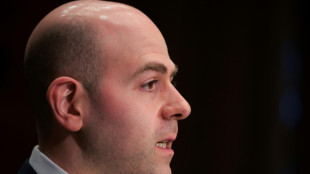 The Trump adviser who wants to rewrite the global financial system
The Trump adviser who wants to rewrite the global financial system
-
US senator travels to El Salvador over wrongly deported migrant


How a Brazilian chief is staving off Amazon destruction
You don't need a GPS to find the home turf of the Amazon's most famous resident, Brazilian Chief Raoni Metuktire.
As you approach his Capoto/Jarina Indigenous territory in Mato Grosso state, large single-crop farms of soybean or maize give way to lush, verdant rainforest.
This is the epicenter of a half-century battle led by the globe-trotting activist against illegal miners and loggers hacking away at the world's biggest rainforest.
Instantly recognizable by his wooden lip plate and feathery headdress, Raoni's date of birth is unknown, but he is believed to be about 90.
Three decades ago, he toured the world with British activist-rock star Sting to press for Indigenous rights.
His home village of Metuktire, named after his clan belonging to the Kayapo people, is accessible chiefly by boat along the Xingu River, a tributary of the Amazon.
The formidable chief lived most of his life in one of the straw-and-wood huts arranged in a wide circle around a forest clearing.
He now resides mostly in the nearby city of Peixoto de Azevedo for health reasons, but will be back on his home soil Friday to receive President Luiz Inacio Lula da Silva.
Raoni told AFP in an interview ahead of the visit that he would press Lula to halt plans for an oil mega-project at the mouth of the Amazon river, and urge that the community should get custodianship of a bigger slice of forest.
"I don't allow illegal miners or timber traffickers on our land," the chief told AFP emphatically.
Raoni's 1,600-strong community has a two-pronged approach to defending its ancestral homeland: conducting patrols against intruders and teaching Indigenous youth to resist the temptation of getting rich quick at the cost of rainforest destruction.
Only 0.15 percent of Capoto/Jarina territory, which occupies an area four times the size of the mega-city of Sao Paulo, has been affected by deforestation, according to official statistics.
- 'This land is ours' -
Designating land as Indigenous territory -- where deforestation is a crime -- has proven effective in holding back the ferocious onslaught from illegal mining and agriculture.
Indigenous territories have lost less than 2.0 percent of their native plant species since 2008, compared to 30 percent on non-Indigenous lands, according to the Socio-Environmental Institute, a Brazilian NGO.
Bu to have his clan's land recognized as Indigenous territory by the state, Raoni had to resort to desperate measures.
Brazilian media have recounted how in 1984 he and his nephew hijacked a ferry, taking hostage officials from the military dictatorship then in power.
Forty days later, the state conceded.
"Garimpeiros (miners) and Whites wanted to occupy our land, but we fought until we expelled them forever," Beptok Metuktire, another leader of the community, where most use the clan name as a surname, told AFP.
"We showed them that this territory is ours," the 67-year-old added in the community's Kayapo language.
- 22,000 football fields -
Indigenous lands are nonetheless under attack, stripped every year of thousands of hectares of native vegetation.
Near the Capoto/Jarina territory, in an area inhabited by other branches of Raoni's Kayapo people, the emerald-green jungle is pockmarked by huge brown craters and pools of brackish water -- the hallmarks of illegal gold mining.
AFP saw dozens of hydraulic excavators operated by workers camped out at the site during a flight organized by environmental NGO Greenpeace.
Kayapo territory has lost the equivalent of 22,000 football fields of forest to illegal gold mining, according to Greenpeace, which notes the growing presence of organized crime groups such as Comando Vermelho, one of Brazil's biggest gangs, in the region.
"White people persuade some Indigenous leaders to mine for gold, which leads to disputes and even murders among families," said Roiti Metuktire, territorial protection coordinator at the Raoni Institute, which defends Indigenous rights.
"Changing this is difficult because people got used to the money from crime and because the land has already been degraded, they don't have anything to eat," he said.
- 'End of our world' -
While Raoni's homeland has so far managed to ward off the worst threats, one looms larger than ever: wildfires.
The Brazilian Amazon was ravaged by a staggering 140,000 fires last year -- many of them started to clear land for livestock or crops.
A blaze in Capoto/Jarina wiped out crops and medicinal plants, fellow community leader Pekan Metuktire said.
"When I was young, the climate in this village was normal. But now the sun burns, the land dries up and the rivers overflow. If this continues, it's the end of our world," he added.
The community hopes that UN conference on climate change that Lula will host in the Amazon city of Belem in November will help halt the destruction.
Ngreikueti Metuktire, a 36-year-old woman, summed up the tall task awaiting Brazil's leader, before heading to the fields to harvest cassava.
"We need Lula to speak to the world to ensure the future of our grandchildren."
G.Frei--VB
